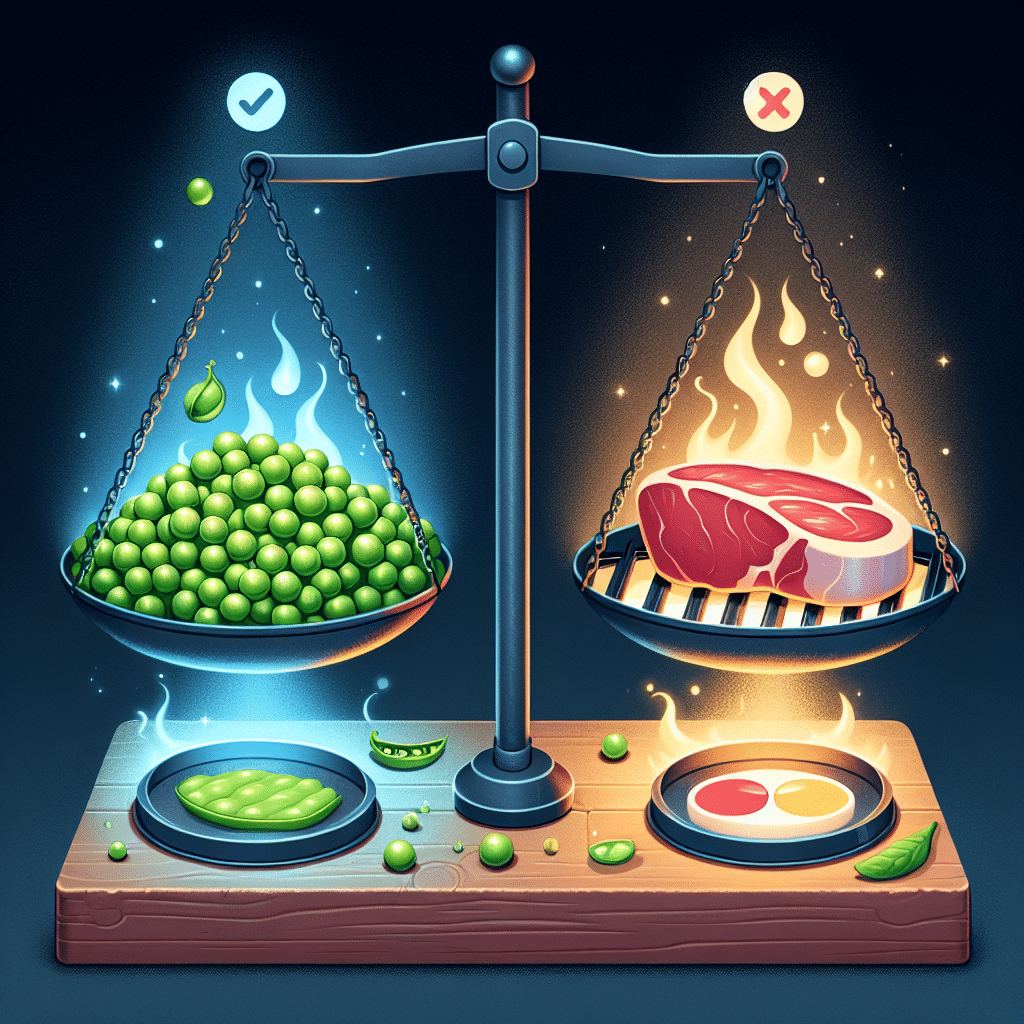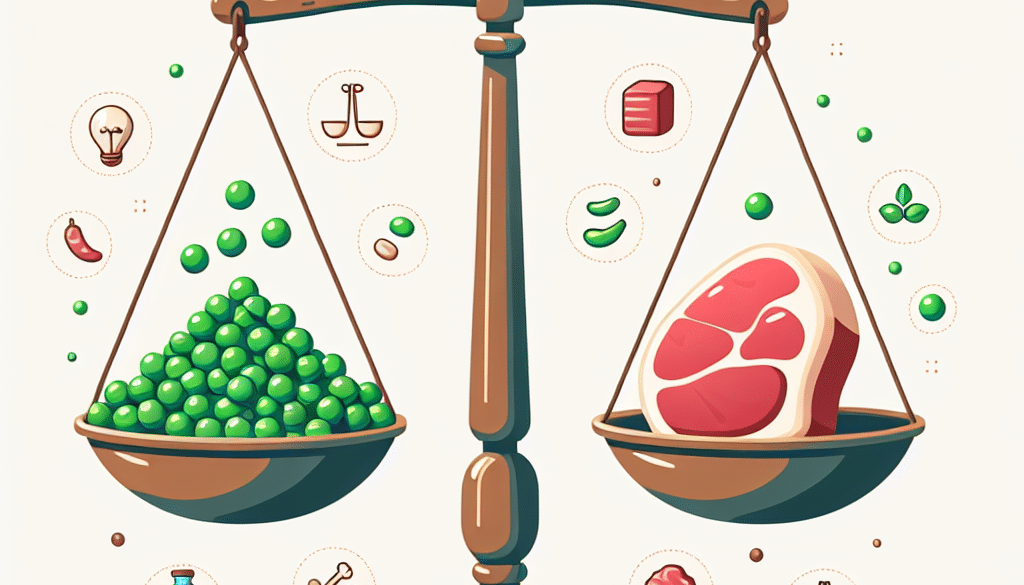Is pea protein better than meat protein?
-
Table of Contents
Pea Protein vs. Meat Protein: Which is the Superior Source?

Protein is a crucial macronutrient that plays a vital role in building and repairing tissues, making enzymes and hormones, and supporting overall health. With the rise of plant-based diets and sustainability concerns, pea protein has emerged as a popular alternative to traditional meat protein. This article delves into the debate of whether pea protein is better than meat protein, examining various factors such as nutritional content, environmental impact, and health benefits.
Nutritional Comparison
When comparing pea protein to meat protein, it’s essential to consider their nutritional profiles. Meat protein, such as beef, chicken, and fish, is known for being a complete protein source, meaning it contains all nine essential amino acids that the body cannot produce on its own. On the other hand, pea protein is also rich in essential amino acids, though it is slightly lower in methionine.
- Amino Acid Profile: While meat provides a complete amino acid profile, pea protein is supplemented with other plant proteins to achieve a balanced amino acid composition.
- Protein Content: Meat typically offers a higher protein content per serving compared to pea protein. However, pea protein isolates are concentrated to provide comparable protein levels.
- Fiber: Pea protein has the added benefit of containing dietary fiber, which is absent in meat.
- Fat Content: Meat can be higher in saturated fats, whereas pea protein is naturally low in fat and contains no cholesterol.
Environmental Impact
The production of pea protein is generally considered to be more environmentally friendly than that of meat. The cultivation of peas requires less water and land and generates fewer greenhouse gas emissions compared to livestock farming.
- Water Usage: Pea crops require significantly less water than the amount needed to raise animals for meat.
- Land Use: Growing peas takes up less land and can improve soil health through nitrogen fixation, whereas meat production often leads to deforestation and habitat destruction.
- Greenhouse Gas Emissions: The livestock industry is a major contributor to methane emissions, a potent greenhouse gas, while peas have a much lower carbon footprint.
Health Benefits and Concerns
Both pea protein and meat protein offer health benefits, but they also come with their own set of concerns. It’s important to consider these when choosing the best protein source for your diet.
- Digestibility: Pea protein is easily digestible and hypoallergenic, making it a suitable option for those with food sensitivities or allergies to common protein sources like dairy or soy.
- Heart Health: The absence of cholesterol and lower levels of saturated fat in pea protein may contribute to better heart health compared to red meat.
- Hormones and Antibiotics: Meat can contain hormones and antibiotics used in animal farming, which raises concerns about antibiotic resistance and hormonal imbalances in humans. Pea protein is free from these substances.
- Heavy Metals: Some plant-based proteins have been found to contain traces of heavy metals due to soil contamination. It’s essential to choose high-quality, tested pea protein products to minimize this risk.
Case Studies and Research
Several studies have compared the effects of plant-based proteins like pea protein to animal-based proteins. For instance, a study published in the Journal of the International Society of Sports Nutrition found that pea protein promoted muscle thickness gains just as effectively as dairy-based whey protein in athletes. Another research indicated that incorporating plant-based proteins could reduce the risk of chronic diseases such as heart disease and type 2 diabetes.
Consumer Preferences and Trends
The demand for plant-based proteins is on the rise, driven by health-conscious consumers, ethical considerations, and environmental sustainability. Pea protein has gained popularity due to its versatility in products like protein shakes, bars, and meat substitutes, catering to the growing vegan and vegetarian population.
Conclusion: Weighing the Pros and Cons
In conclusion, both pea protein and meat protein have their advantages and drawbacks. Pea protein offers a sustainable, allergen-friendly, and heart-healthy alternative to meat protein, with a growing body of research supporting its efficacy. Meat protein provides a complete amino acid profile and higher protein content but comes with environmental and health concerns. Ultimately, the choice between pea protein and meat protein depends on individual dietary needs, ethical beliefs, and environmental priorities.
Discover ETprotein’s High-Quality Protein Products
If you’re looking to incorporate pea protein into your diet, ETprotein offers a range of premium plant-based protein products. Their organic pea protein is characterized by a neutral taste, non-GMO, and allergen-free attributes, ensuring you receive the highest quality protein for your nutritional needs. Whether you’re a distributor, trader, or manufacturer, ETprotein can provide tailored protein solutions to support your health and wellness goals.
About ETprotein:
ETprotein, a reputable protein and L-(+)-Ergothioneine (EGT) Chinese factory manufacturer and supplier, is renowned for producing, stocking, exporting, and delivering the highest quality organic bulk vegan proteins and L-(+)-Ergothioneine. They include Organic rice protein, clear rice protein, pea protein, clear pea protein, watermelon seed protein, pumpkin seed protein, sunflower seed protein, mung bean protein, peanut protein, and L-(+)-Ergothioneine EGT Pharmaceutical grade, L-(+)-Ergothioneine EGT food grade, L-(+)-Ergothioneine EGT cosmetic grade, L-(+)-Ergothioneine EGT reference grade and L-(+)-Ergothioneine EGT standard. Their offerings, characterized by a neutral taste, non-GMO, allergen-free attributes, with L-(+)-Ergothioneine purity over 98%, 99%, cater to a diverse range of industries. They serve nutraceutical, pharmaceutical, cosmeceutical, veterinary, as well as food and beverage finished product distributors, traders, and manufacturers across Europe, USA, Canada, Australia, Thailand, Japan, Korea, Brazil, and Chile, among others.
ETprotein specialization includes exporting and delivering tailor-made protein powder and finished nutritional supplements. Their extensive product range covers sectors like Food and Beverage, Sports Nutrition, Weight Management, Dietary Supplements, Health and Wellness Products, and Infant Formula, ensuring comprehensive solutions to meet all your protein needs.
As a trusted company by leading global food and beverage brands and Fortune 500 companies, ETprotein reinforces China’s reputation in the global arena. For more information or to sample their products, please contact them and email sales(at)ETprotein.com today.














